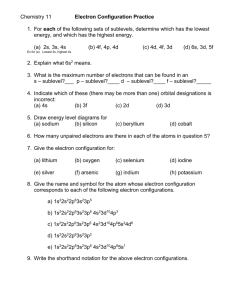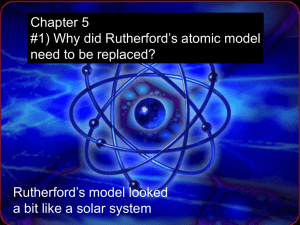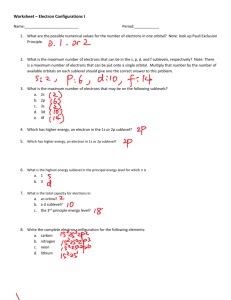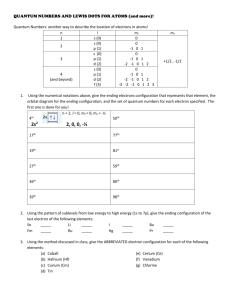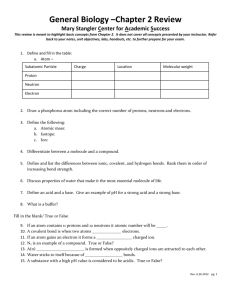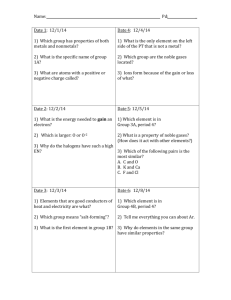Electron Configuration Extra credit Question: 1 2 3 4 5 6 7 8 9 10 11
advertisement
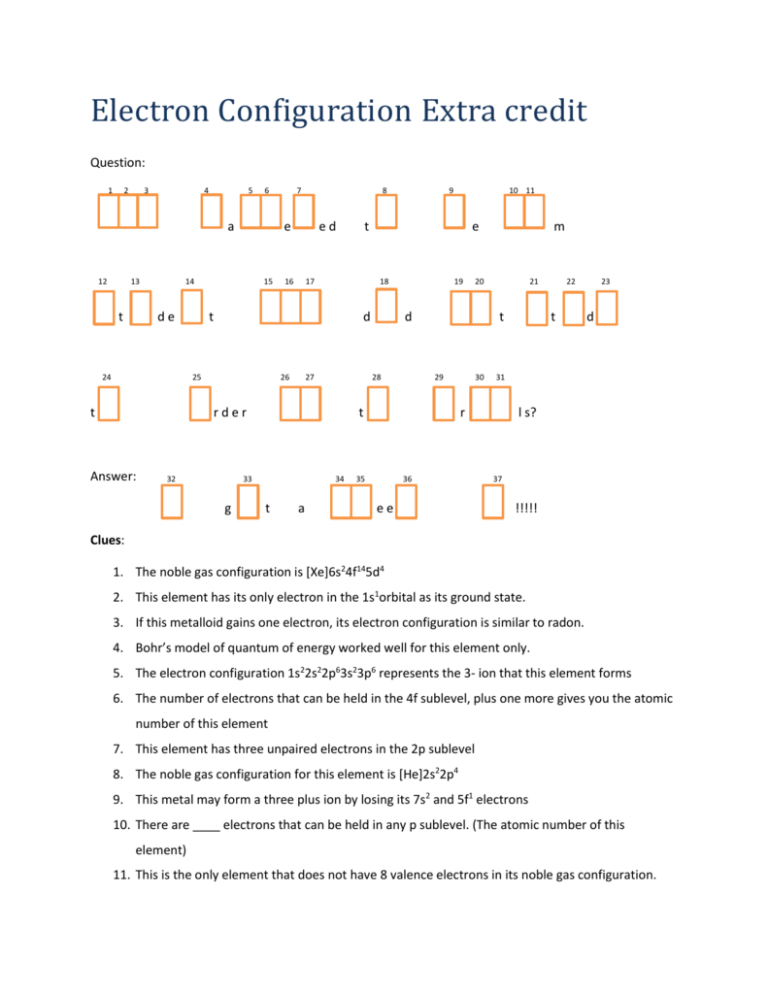
Electron Configuration Extra credit Question: 1 2 3 4 5 6 a 12 13 t 24 15 ed 16 18 27 Answer: 32 34 t a m 20 d 21 t 29 t 33 g 19 28 rder 10 11 e d 26 9 t 17 t 25 t 8 e 14 de 7 30 36 ee t 23 d 31 r 35 22 l s? 37 !!!!! Clues: 1. The noble gas configuration is [Xe]6s24f145d4 2. This element has its only electron in the 1s1orbital as its ground state. 3. If this metalloid gains one electron, its electron configuration is similar to radon. 4. Bohr’s model of quantum of energy worked well for this element only. 5. The electron configuration 1s22s22p63s23p6 represents the 3- ion that this element forms 6. The number of electrons that can be held in the 4f sublevel, plus one more gives you the atomic number of this element 7. This element has three unpaired electrons in the 2p sublevel 8. The noble gas configuration for this element is [He]2s22p4 9. This metal may form a three plus ion by losing its 7s2 and 5f1 electrons 10. There are ____ electrons that can be held in any p sublevel. (The atomic number of this element) 11. This is the only element that does not have 8 valence electrons in its noble gas configuration. 12. The atomic number of this element is equal to two more than the number of electrons that can be held in the 5f sublevel plus 2 more electrons. 13. The atomic number of this element is equal to the sum of the atomic number of the 2+ ion which has a noble gas configuration of [Kr]4d2 plus the atomic number of the 2- ion which has a noble gas configuration similar to Xe. 14. The atomic number of this element is the number of orbitals found in any f sublevel. 15. There are 4 unpaired electrons in the 5d sublevel 16. The atomic number of this element is equal to the number of unpaired ‘p’ electrons in a bromine atom. 17. According to Hund’s Rule, this element will have 2 unpaired electrons in the 2p sublevel 18. 1s22s22p63s23p64s23d104p65s24d105p5 19. The atomic number is equal to the number of ‘d’ electrons in cobalt 20. The atomic number is equal to the number of ‘f’ electrons in Tb 21. The 2- ion has an electron configuration of 1s22s22p63s23p6 22. This element is [Rn]7s25f3 23. The 3+ ion has an electron configuration similar to Kr 24. Its octet is complete with 2 electrons 25. It has similar chemical properties to S, Se, Te and Po as it has a similar valence configuration 26. The 2- ion has the noble gas configuration of [He]2s22p6 27. This element really likes to gain 1 electron to complete the 2p sublevel 28. This element has similar chemical properties to Rn, Xe, Kr, Ar, and Ne 29. When it forms its 2- ion it has similar properties to Ne 30. The 3+ ion has a noble gas configuration of [Xe]6s24f145d10 31. The 2+ ion has a noble gas configuration of [xe]6s04f145d3 32. 1s2 33. [He]2s22p4 34. The 2-ion has a configuration of 1s22s22p63s23p6 35. The 3-ion has a configuration of 1s22s22p63s23p6 36. This element has 9 electrons in the 4f sublevel 37. The most reactive nonmetal on the periodic table. It has the configuration of 1s22s22p5
